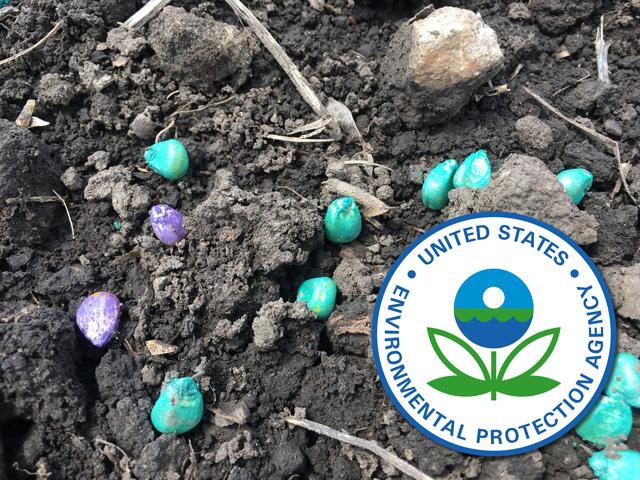Treated Seeds a Focus of Consent Decree
EPA to Act on Regulatory Oversight of Pesticide-Treated Seeds
OMAHA (DTN) -- The Environmental Protection Agency will decide by Sept. 30 to spell out how much regulatory oversight is needed for pesticide-treated seeds after the agency opted for five years not to respond to regulatory demands for oversight of treated seeds from environmental groups.
The decision could affect seeds for nearly every corn and soybean acre planted, as well as other crops.
EPA on Wednesday published a proposed consent decree for a lawsuit filed last December by the Center for Food Safety and the Pesticide Action Network North America. The agreement states EPA will decide by Sept. 30 on whether to begin drafting regulations for treated seeds or reject the environmental groups' demands. The two groups had sued EPA because the agency had not responded to a 2017 petition filed by the groups demanding EPA regulate treated seeds as a pesticide rather than allow treated seeds to avoid regulations under EPA's "Treated Article Exemption" in the Federal Insecticide, Fungicide and Rodenticide Act (FIFRA).
In late 2018 and early 2019, EPA asked for public comments on the environmental groups' petition and got back 16,343 total comments on it. EPA then never followed up on how to handle the petition, sparking the lawsuit.
EPA, the Center for Food Safety and Pesticide Action Network agreed to settle the lawsuit with EPA agreeing by Sept. 30 to either grant, deny or deny in part the environmental groups' petition. In doing so, EPA also is opening a public comment period until Aug. 5 for the public and stakeholders such as farm groups to weigh in on EPA's proposed settlement. Based on those comments, EPA or the Justice Department could withdraw or delay the consent decree as well.
Asked for comment, Bethany Shively, a spokeswoman for the American Seed Trade Association (ASTA), said the group, Crop Life America and grower groups continue to stand by comments they had made to EPA in 2018.
P[L1] D[0x0] M[300x250] OOP[F] ADUNIT[] T[]
"There is no basis whatsoever for any claim that pesticides applied as seed treatments are 'not regulated' by EPA under FIFRA and/or are subject to a 'regulatory loophole.' All pesticides approved for use as seed treatments are subject to rigorous, scientifically robust review by EPA," Shively stated in an email to DTN. "Efforts to require separate and/or additional registrations for seeds treated with crop protection products would unnecessarily duplicate EPA's existing exercise of authority under FIFRA, and place tremendous burdens on growers, while having no impact on human health or environmental safety."
Amy van Saun, a spokeswoman for the Center for Food Safety, said the group is pleased that EPA has agreed to answer the group's petition and she called for the agency to follow through on the need for regulatory oversight.
"EPA is gearing up to provide an answer to our petition to close the loophole that allows seeds coated with pesticides to avoid the same regulation as regular pesticides," van Saun stated in an email to DTN. "Seed coating is the major way that neonicotinoids are used and have dire consequences for pollinators. EPA should grant our petition and ensure that these crucial pollinators are protected from the harms of coated seeds."
Reflecting some of the challenges farmers have disposing of leftover treated seeds, the Pesticide Stewardship Alliance -- a group made up of primarily the major seed companies -- last month released a 10-state map (https://tpsalliance.org/…) in the Corn Belt showing contact information for state agencies and regulations to dispose of pesticide-treated seeds.
In their lawsuit, the environmental groups alleged EPA's refusal to take action on their petition has allowed "irreparable environmental harms" from treated seeds. The groups noted EPA has never spelled out a rule on its decision to exempt pesticide-treated seeds. EPA instead used a 2013 guidance document on pesticide-related bee deaths to exempt treated seeds from regulation.
Treated seeds are now used on an estimated 180 million acres. As DTN reported a year ago, "The seed treatment industry operates with minimal federal oversight, due to a loophole in EPA's governing law, leaving questions about the amount of pesticides applied via this route and how unused treated seed is discarded each year. In the meantime, a growing number of federal and academic studies are casting doubt on its necessity, particularly in soybean fields. Another body of research is finding most of the pesticides coated on the seeds aren't staying put, with alarming consequences for water quality and wildlife." See "Seed Treatment Overload: The Unintended Consequences of a Popular Practice" https://www.dtnpf.com/….
The lawsuit also cited the accumulation of tens of thousands of tons of treated seed at the now-closed AltEn ethanol plant in Mead, Nebraska, which led to contamination of ground and surface water and continues to be in environmental remediation with more than 84,000 tons of toxic distilled grain piled on the site. University groups continue to study the health effects on people who live in the vicinity.
See "Health Monitoring Planned in Mead, NE" https://www.dtnpf.com/….
Also See "Seed Companies Sue AltEn Over Cleanup" https://www.dtnpf.com/….
Link to EPA proposed decree and public comment section https://www.regulations.gov/….
Chris Clayton can be reached at Chris.Clayton@dtn.com
Follow him on Twitter @ChrisClaytonDTN
(c) Copyright 2022 DTN, LLC. All rights reserved.





